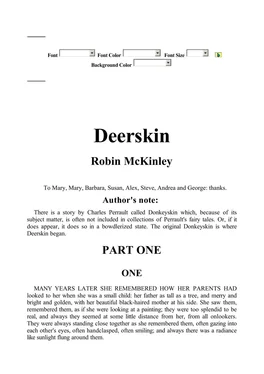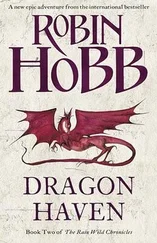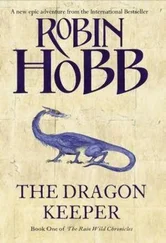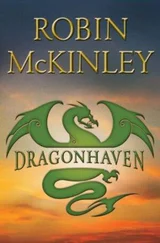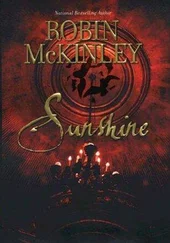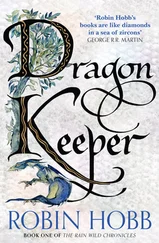Deerskin - Robin McKinley
Здесь есть возможность читать онлайн «Deerskin - Robin McKinley» весь текст электронной книги совершенно бесплатно (целиком полную версию без сокращений). В некоторых случаях можно слушать аудио, скачать через торрент в формате fb2 и присутствует краткое содержание. Жанр: Старинная литература, на русском языке. Описание произведения, (предисловие) а так же отзывы посетителей доступны на портале библиотеки ЛибКат.
- Название:Robin McKinley
- Автор:
- Жанр:
- Год:неизвестен
- ISBN:нет данных
- Рейтинг книги:4 / 5. Голосов: 1
-
Избранное:Добавить в избранное
- Отзывы:
-
Ваша оценка:
- 80
- 1
- 2
- 3
- 4
- 5
Robin McKinley: краткое содержание, описание и аннотация
Предлагаем к чтению аннотацию, описание, краткое содержание или предисловие (зависит от того, что написал сам автор книги «Robin McKinley»). Если вы не нашли необходимую информацию о книге — напишите в комментариях, мы постараемся отыскать её.
Robin McKinley — читать онлайн бесплатно полную книгу (весь текст) целиком
Ниже представлен текст книги, разбитый по страницам. Система сохранения места последней прочитанной страницы, позволяет с удобством читать онлайн бесплатно книгу «Robin McKinley», без необходимости каждый раз заново искать на чём Вы остановились. Поставьте закладку, и сможете в любой момент перейти на страницу, на которой закончили чтение.
Интервал:
Закладка:
She loved them all. She tried not to think about Ossin's teasing about their being hers; she tried not to think of how they must leave her soon, or she them. She knew they would be old enough soon to need her no longer-indeed they no longer needed her now, but she supposed that the prince would let her remain with them to the end of their childhood, and she was glad of the reprieve: to enjoy them for a little while, after worrying about them for so long.
During the days now they wandered through the meadows beyond the kennels, she and Ash and a low silky pool of puppies that flowed and murmured around them. Even on most wet days they went out, for by the time the puppies were two months old, getting soaked to the skin was preferable to trying to cope with six young fleethounds' pent-up energy indoors. Even worrying that they might catch cold was better than settling the civil wars that broke out if they stayed in their pen all day.
Lissar could by now leave them as she needed to, although the tumultuousness with which they greeted her reappearance was a discouragement to going away in the first place. She no longer slept every night in the pen; but then neither did they. Her room was up two flights of stairs, and even long-legged fleethound puppies need a little time to learn to climb (and, more important, descend) stairs; and she had assumed that as weaning progressed she ought to wean them of her presence as well. But the little bare room felt hollow, with just her and Ash in it, and it recalled strongly to her mind her lingering dislike of sleeping under roofs. She thought about the fact that the prince's two favorite dogs went almost everywhere with him (they slept by the door of the puppies' pen on the nights he spent there), and that Jobe and Hela and the others usually had a dog or three sleeping with them.
No one but Lissar had seven. She had crept up very late the first night out of the pen, puppies padding and tumbling and occasionally yelping behind her. She'd been practicing for this with some outside steps conveniently located for such a purpose.
The puppies were ready-they were always ready-for anything that looked like a game; Climbing Stairs was fine with them. Harefoot was the cleverest at it straight away; she and Pur were the two tallest, but she carried her size the more easily. At first they only spent half the night upstairs; two flights were simply too many to have to go up and down more than once, and the puppies were learning that there was a difference between under-a-roof and out-of-doors in terms of where they were allowed to relieve themselves. Fleethounds were tidy dogs, and quick to catch on; but infant muscular control can do only so much. By the end of the first week of the new system, they were waking Lissar up at midnight, and going to stand by the pen door in an expectant manner; although Meadowsweet and Fen took turns needing to be carried upstairs, and occasionally Ferntongue forgot as well. But there were only one or two accidents on the bare, easily cleaned floor of the bedroom, neatly deposited in some corner, well away from the mattress Lissar had dragged off the bed so they could all sleep on it more comfortably.
Her puppies were sleeping through the night by the time they were three months old.
"That's extraordinary," Hela said, when, at three and a half months, Lissar told her this. "That's extraordinary," was also what Hela had said the first time she saw the puppy waterfall pouring down the stairs.
"They're extraordinary puppies," said Lissar proudly, trying not to grin foolishly, at the same time reaching over to pry Fen's teeth out of Pur's rump. But she looked up, smiling, at Hela's face, and there was that look again; the look at Lilac's breakfast table, the look the kennel staff had given her the first evening in the common-room.
The look that had become almost palpable the afternoon she had told the story of Ash and her escape from the dragon. She had only even told it accidentally, uneasy as she was in the common-room, and not accustomed to lingering there. She was there because Ossin was, and because he obviously assumed that she would stay-that she belonged there, as the rest of the kennel staff did.
"No one can outrun a dragon," Jobe said.
"I know. We were lucky. It couldn't have been very hungry, not to have chased us." But she looked around at the faces looking back at her, and did not see "luck"
reflected in their expressions; and she wished she had said nothing.
But Ossin smiled at her, meeting her eyes as the others had not, and said, "Yes, I remember once when Nob and Tolly and Reant, do you remember him? He ran afoul of that big iruku that long winter we had, when he was only four-we were out looking for the signs of a herd of bandeer that someone had brought word of, and we surprised a pair of dragons feeding on a dead one. They're slower, of course, when they're eating, and they never really believe that anything would dare chase them away from their prey, so they aren't all that belligerent, just mean by nature-but we got out of there in a hurry. I gave the order to scatter, so they'd have a harder time, I hoped, deciding whom to chase. I don't know if that's why they decided to leave us alone or not; the dead bandeer was bigger than any of us."
TWENTY-FOUR
THERE WAS MUCH ACTIVITY IN THE KENNELS DURING HIGH summer.
From midsummer through the harvest was the hunting season; winter began early here, and the snow could be deep soon after harvest. Sometimes the last ricks and bales were raked up while the snow sifted down; sometimes the last hunts were cancelled and the hunters, royal and courtier or district nobility and vassal, helped their local farmers, the snow weighing on shoulders and clogging footsteps with perfect democratic indifference. As often as not the stooked fields were turned briefly into sharp white ranges of topographically implausible peaks and pinnacles before the farm waggons came along to unmake them gently into their component sheaves and bear them off to the barns.
The hunting-parties went out as late in the year as they could; while the season lasted-so long as the weather threatened neither blizzards nor heatstroke-Ossin rode out himself nearly every day. The inhabitants of the king's court depended on the huntsfolk and their dogs to provide meat for the table. The court held no farmland of its own, and while the king could tax his farmers in meat, no king ever had. All the wild land, the unsettled land, belonged to the royal family, who leased it as they chose to smallholders, or awarded it to their favorites-or took it back from those who angered or, betrayed them. Their own flocks were the wild beasts of the forests and hills; and wild game was considered finer meat, more savory and health-giving, than anything a farmer could raise. Rights and durations of royal land use leases were very carefully negotiated; if the land was to be cleared for agriculture, then cleared it must be; if it was to be kept wild for hunting, the king had the power to declare, each year, how much game could be taken on each leasehold (the position of royal warden, and advisor to the king on the delicate question of yearly bags, was much prized), and to name who led and maintained any local hunt. (In practice, however, the latter generations of Goldhouses were all good-natured, and almost always said "Yes" to any local nomination.) This also meant that if any aristocratic or royal tastes ran toward chicken or mutton, the noble bargainer was in an excellent position to make a trade.
The prince hunted not only for those lucky enough to live in the king's house, but also for all those that royalty owed favors, or wished to create a favor in, by a gift of wild game, or a lanned skin; for wild leather was also considered superior. The k,ing himself rode with the hunt but seldom any more, but the leather that he and his craftsmen produced was very fine, and it vas not merely the cachet of royalty that produced its reputation. Potted meat from the royal kitchens was also highly prized; no meat was ever allowed to go to waste, no matter how hot the summer, and the apprentice cooks were rigorously taught drying and salting, boiling and bottling.
Читать дальшеИнтервал:
Закладка:
Похожие книги на «Robin McKinley»
Представляем Вашему вниманию похожие книги на «Robin McKinley» списком для выбора. Мы отобрали схожую по названию и смыслу литературу в надежде предоставить читателям больше вариантов отыскать новые, интересные, ещё непрочитанные произведения.
Обсуждение, отзывы о книге «Robin McKinley» и просто собственные мнения читателей. Оставьте ваши комментарии, напишите, что Вы думаете о произведении, его смысле или главных героях. Укажите что конкретно понравилось, а что нет, и почему Вы так считаете.
